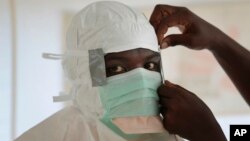Leaders of the world’s 20 largest economies, the so-called G-20 nations, met recently in Australia to increase cooperation on addressing serious global issues ranging from poverty to climate change. They also took up West Africa’s Ebola epidemic, agreeing to coordinate a stronger response to the crisis.
Attending heads of state said they were committed to do what is necessary to ensure a coordinated international effort to stem the outbreak and address its medium-term economic and humanitarian costs. They also urged the World Bank and International Monetary Fund to continue their strong support for the affected countries, and welcomed an IMF initiative to provide another $300 million in medical and economic aid.
The United States is a leading member of the G-20 and is fully committed to the initiative. We are also partnering with the United Nations and other international partners to aid in the crisis, and have issued a call to action to the private sector. Hundreds of millions of dollars have been raised from individuals, non-profits and others, providing critical assistance in the international response. Many areas of great need remain, however.
A full range of U.S. government agencies are increasing assistance to the affected countries and their citizens, international organizations and nongovernmental groups. This includes medical teams, equipment and other essential supplies, and public health messaging efforts.
The United States is also supporting public education and outreach campaigns in the region, reaching some of the most remote areas with life-saving information on how to identify, treat, and prevent Ebola. These messages are being conveyed through radio, text, newspapers and word of mouth.
President Obama and the U.S. government as a whole also have a comprehensive strategy to prevent any transmission of the disease in the United States. As the president has noted, stopping the epidemic at its source in West Africa is the only way to end the Ebola threat.
West Africa is facing the largest, most devastating Ebola outbreak in history. We are fully committed to the coordinated global effort that is needed to stop this epidemic and help the affected countries recover.

















